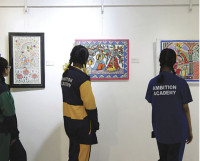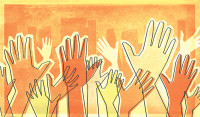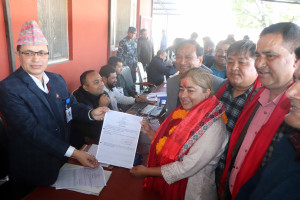Opinion
Going against the current
To avoid the disastrous consequences of earthquakes, we must promote sustainable development practices
Yuba Raj Guragain
The recent earthquake wrecked devastation in different parts of the country. It took more than 8,500 lives and left hundreds of thousands of people bereft of their properties. While the devastation was overwhelming, the quake not only taught us the value of human relationship and partnership but also made us interrogate our perceptions about modernisation and development. After all, the very symbols of modernity, concrete houses, roads, bridges and other infrastructure, were turned into weapons of destruction by the quake.
In the aftermath of the quake, it has become necessary to evaluate our beliefs about development, locate flaws in them and try to rectify these ideas. Since we are now moving towards the reconstruction phase, it is important that we analyse and modify these development concepts so that we do not repeat the mistake all over again.
The social cost
Much of what is perceived as ‘development’ by our society exists in purely quantitative terms. It is, for example, calculated in terms of industrial output and GDP, and understood in terms of material worth and infrastructural development. But in the process of quantifying and monetising development, we often tend to ignore the values and cultural attributes of human society and communities.
This is especially relevant with regards to a third-world country like ours, which, rife with poverty and inequality, has come to see development only in terms of material prosperity. So before we move towards ‘building back better’ it is better if we understand some ideas in development studies that stand against the tide of popular opinion.
Denis Goulet, a human development theorist who also contributed to the establishment of development ethics as an independent field of study, is one such person who has stood against this quantitative wave that has swept this discourse. He argues against the ‘particular kind of social engineering’ that solely focuses on economic improvement, institutional modernisation and technological efficiency by enhancing social injustice, fostering social inequalities and destroying local institutions, cultural values and traditional networks of solidarity.
Being good aspect
Goulet’s ‘being good’ aspect of development, which tries to accommodate these cultural and human notions in development practices, provides a powerful antidote to the popular opinion. ‘Being good’ simply refers to the promotion of mutual cooperation, partnership, trust and knowledge among the members of a community. It also emphasises on the use of local materials and expertise in fulfilling local needs.
This idea perfectly chimes with the experience of many Nepalis post-quake. Having lost our houses or felt unsafe in them, many of us shifted to communal spaces like grounds, community halls and other buildings where we shared our space, food and ideas with neighbours. Many of us also took refuge in sheds constructed by ourselves using materials available around us. And we did receive help, both monetary and in kind, from people and organisations throughout the world. The quake might have been devastating, but it did reinforce the importance of shared values and cooperation. It also proved that human values, partnerships and sentiments defy borders.
While one can argue that this sort of adjustment can prove to be a tough job in the real world, one cannot ignore that this system has been prevalent in our communities since long time back. Our values have taught us to place the community before the self, to promote harmony and cooperation among members of different groups and divide the available resources equitably among ourselves.
It was from the West that we borrowed the ideas of overexploiting natural resources, fierce competition, and prioritisation of economic growth above everything else. But we always forgot that these achievements could turn into ruins in the blink of an eye and that societies and communities do not just operate on the material sphere. Now that we have to move forward to reconstruct the damaged infrastructure, provide permanent rehabilitation to approximately 750,000 households of different communities and relocate more than a hundred villages susceptible to landslides and floods, it is important that we change our vision and perspective to suit the more humane form of development.
The starting point
Although long-term plans of the government regarding this kind of development model is yet to come out, there are certain things that it can start doing right now. First, though there is a demand among the members of the Nepalese intellectual communities for integrated model villages in Nepal, they are yet to come up with a proper blueprint. We have to finalise what kind of houses we want in these villages, their numbers and the kinds of materials we would be using to construct these structures. When the construction process begins, we should emphasise on local manpower and expertise and make sure that these houses can withstand the calamities the area is susceptible to (if any).
Also, implementing a single pattern of supply and arrangement of social services and infrastructure (like road, electricity, drinking water, health, banking, school, market) can play a key role to enhance cooperation and promote shared responsibility and mutual accountability for communal goods. This sort of system would not just make a community accountable for managing and dividing resources among themselves, but it would make it easy for the government to focus on other things. And since the plan is to set up integrated villages, there is no requirement to have multiple service centres. Moreover, this would also an provide opportunity for the people from different cultural backgrounds to interact and share knowledge among themselves.
Finally we have to realise that sustainable development practices will not just benefit the present generation but also our future generation. Promoting such practices will help us secure the happiness of those that come after us. For, if society is structured on the basis of partnership rather than hierarchy and domination, and culture is used to promote cooperation and philanthropic values, then we can make sure that everybody gets his share and no one is left behind.
Guragain is Section Officer at Election Commission ([email protected])




 5.12°C Kathmandu
5.12°C Kathmandu










